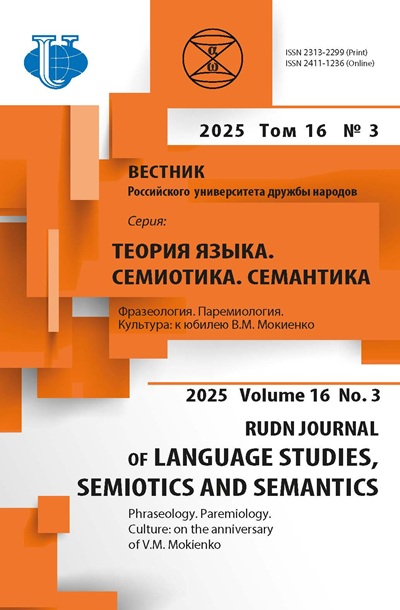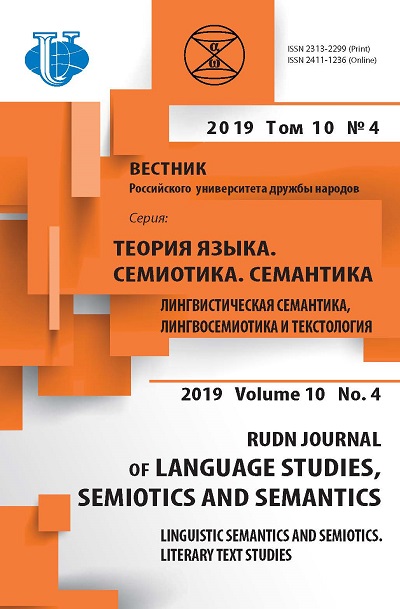Говорящий как субъект деонтики в политической речи (на материале немецкого и русского языков)
- Авторы: Сытько А.В.1
-
Учреждения:
- Минский государственный лингвистический университет
- Выпуск: Том 10, № 4 (2019): Лингвистическая семантика, лингвосемиотика и текстология
- Страницы: 1003-1020
- Раздел: СЕМИОТИКА И КОММУНИКАЦИЯ
- URL: https://journals.rudn.ru/semiotics-semantics/article/view/22782
- DOI: https://doi.org/10.22363/2313-2299-2019-10-4-1003-1020
- ID: 22782
Цитировать
Полный текст
Аннотация
Данная работа посвящена проблеме семантической и функциональной вариативности деонтических конструкций, где субъектом деонтики выступает сам говорящий, в ядерном жанре политического дискурса - политической речи - в немецкой и русской лингвокультурах. Материалом послужили деонтические высказывания с прототипическими модальными экспликаторами, такими как должен, ich muss, kann, darf, надо/нужно. На основе контекстуального анализа выявляется обусловленная социокультурным контекстом семантическая многозначность модальных конструкций с деонтическим субъектом-говорящим и глаголами говорения. Метод функционально-семантического описания позволяет раскрыть дискурсивную полифункциональность данных деонтических высказываний.
Об авторах
Анна Васильевна Сытько
Минский государственный лингвистический университет
Автор, ответственный за переписку.
Email: anns55555@yahoo.de
кандидат филологических наук, зав.кафедрой фонетики и грамматики немецкого языка
ул. Захарова, д. 21, Минск, Республика Беларусь, 220035Список литературы
- Задворная Е.Г. Дискурсия // Постмодернизм. Энциклопедия. Мн.: Интерпрессервис; Книжный Дом, 2001. Режим доступа: http://textarchive.ru/c-1069760-pall.html (дата обращения: 14.03.2019).
- Греймас А.Ж., Фонтаний Ж. Семиотика страстей. От состояния вещей к состоянию души, пер. с фр. д-ра филологии Лимож. ун-та (Франция), к.филол.н. (Россия) И.Г. Меркуловой. М.: ЛКИ, 2007.
- Национальный корпус русского языка. Режим доступа: http://www.ruscorpora.ru. (дата обращения: 31.01.2019).
- Падучева Е.В. Модальность. Материалы для проекта корпусного описания русской грамматики (http://rusgram.ru). На правах рукописи. М., 2016. Режим доступа: http://rusgram.ru/ Модальность#212. (дата обращения: 14.02.2019).
- Карасик В.И. Язык социального статуса. М.: Институт языкознания АН СССР, Волгоградский педагогический институт, 1991.
- Апресян Ю.Д. Перформативы в грамматике и словаре // Избранные труды. Т. 2. Интегральное описание языка и системная лексикография. М.: Школа «Языки русской культуры», 1995. С. 199-219.
- Добровольский Д.О., Падучева Е.В. Высказывания от 1-го лица: семантика и прагматика // Логический анализ языка. Моно-, диа-, полилог в разных языках и культурах. M.: Индрик, 2010. С. 104-121.
- Падучева Е.В. Высказывание и его соотнесенность с действительностью: референциальные аспекты семантики местоимений. Изд. 5-е, испр. М.: URSS Изд-во ЛКИ, 2008.
- Апресян Ю.Д. Прагматическая информация для толкового словаря // Избранные труды. Т. 2: Интегральное описание языка и системная лексикография. М.: Школа «Языки русской культуры», 1995. С. 135-155.
- Das Digitale Wörterbuch der deutschen Sprache des 20. Jahrhunderts. Режим доступа: http://www.dwds.de. (дата обращения: 12.06.2019).
- Васильев Л.М. Семантика русского глагола. Уфа: Баш. ун-т, 1981.
- Шилихина К.М. Дискурсивное маркирование нетривиального лексического выбора // Компьютерная лингвистика и интеллектуальные технологии. Материалы ежегодной Международной конференции «Диалог» в 2-х тт. Т. 1. Москва: РГГУ, 2013. С. 625-633.
- Шмелева Т.В. «Так сказать» и «как говорится» // Служебные слова. Новосибирск: НГУ, 1987. С. 125-132.
- Шмелева Т.В. Кодекс речевого поведения // Русский язык за рубежом. 1983. no 1. С. 72-77.
- Падучева Е.В. Неопределенно-личное предложение и его подразумеваемый субъект // Вопросы языкознания, 2012. no 1. C. 27-41.
Дополнительные файлы












